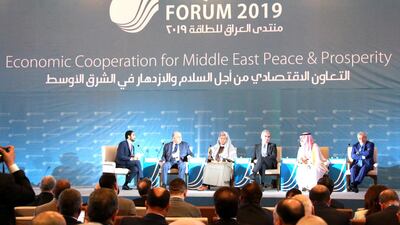Iraq on Sunday signed a landmark deal with the Gulf Cooperation Council for a transmission line that would import 500 megawatts of electricity to its overstretched grid by 2020.
The 300-kilometre transmission line would run from Kuwait to Iraq's southern port of Faw and be financed by the GCC, according to the electricity ministry.
It is the second deal the ministry signed in as many days to boost electricity supply in Iraq, where generation falls about 9 gigawatts below estimated demand of some 24 GW.
Electricity Minister Luay al-Khatteeb signed the agreement with the GCC Interconnection Authority (GCC IA) head Ahmad Ibrahim on the sidelines of an energy conference in Baghdad.
"This is the first deal of its kind with the GCC," Mr Khatteeb told journalists, adding that Iraq was also in separate talks with neighbours Saudi Arabia, Jordan and Turkey to import electricity.
The line from the GCC could be developed further to contribute as much as 2 GW to the grid, he said.
The GCC IA said building the line would cost some $220 million (Dh808m), and a separate agreement would need to be signed on the actual imports.
"This is the first type of linkage outside of the GCC. This is part of our vision," Mr Ibrahim told AFP.
"This first step will pave the way to discuss further and higher capacity projects, not only to supply Baghdad and northern Iraq but also as a pathway to other countries," he said.
Mr Ibrahim said the project had "more than a technical or economic aspect. It has a political aspect".
Baghdad is looking to boost diplomatic ties with Arab neighbours, including Saudi Arabia and Kuwait, but insists it also wants to maintain good relationships with its other powerful neighbour, Iran.
The deal comes a day after Iraq signed a $1.3 billion agreement with German industrial conglomerate Siemens to add 1.7 GW to the grid by repairing war-damaged power plants in the northern city of Baiji.
Iraq partly fills its power shortages by importing both electricity and natural gas from Iran.
It has been granted a series of waivers from Washington to keep importing electricity from Iran despite US sanctions on Tehran, with the latest exemption expiring in mid-October.

